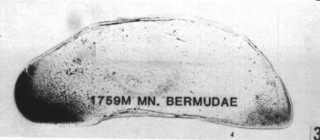WoRMS taxon details
Macrocyprina bermudae Maddocks, 1990
460291 (urn:lsid:marinespecies.org:taxname:460291)
accepted
Species
marine, brackish, fresh, terrestrial
recent only
Maddocks, R. F. (1990). Living and fossil Macrocyprididae (Ostracoda). <em>University of Kansas Paleontological Contributions Monograph.</em> No 2: 1-285. [details]
Holotype USNM 240810
, Type locality contained in Atlantic Ocean
Holotype USNM 240810 [details]
type locality contained in Atlantic Ocean [details]
Etymology "For the island of Bermuda." (Maddocks, 1990: 112)
Stratigraphy Holocene
Etymology "For the island of Bermuda." (Maddocks, 1990: 112) [details]
Stratigraphy Holocene
Stratigraphy Holocene [details]
Brandão, S. N.; Antonietto, L. S.; Pereira, J. S.; Pereira, S. G. G.; Sá, H. A. B.; Praxedes, R. A.; Sabater, L. M., Santos, S.G.; Karanovic, I. (2025). World Ostracoda Database. Macrocyprina bermudae Maddocks, 1990. Accessed through: World Register of Marine Species at: https://www.marinespecies.org/aphia.php?p=taxdetails&id=460291 on 2025-05-29
Date
action
by
![]() The webpage text is licensed under a Creative Commons
Attribution 4.0 License
The webpage text is licensed under a Creative Commons
Attribution 4.0 License
Nomenclature
original description
Maddocks, R. F. (1990). Living and fossil Macrocyprididae (Ostracoda). <em>University of Kansas Paleontological Contributions Monograph.</em> No 2: 1-285. [details]
 Present
Present  Present in aphia/obis/gbif/idigbio
Present in aphia/obis/gbif/idigbio  Inaccurate
Inaccurate  Introduced: alien
Introduced: alien  Containing type locality
Containing type locality
Holotype USNM 240810 [details]
From editor or global species database
Diagnosis "Carapace elongate-oblong in lateral outline; dorsal margin broadly and smoothly arched, with obscurely indicated posterodorsal angle; greatest height located at midlength; anterior margin narrowly and evenly rounded; ventral indentation deep and somewhat angulate; pos teroventral margin not upswung posteriorly; posterior margin broadly and obliquely rounded, forming some what truncate angle of about 72°; zone of concrescence fairly wide; patch pattern consisting of three variable spots. Male fifth limbs very asymmetrical, with tiny pegs and long dorsal seta; distal hook robust and recurved at 66° in right limb, reduced almost to nothing and curved at 151° in left limb. Female fifth limb slender with fairly long claws. Dorsodistal claw of sixth limb about two-thirds as long as mediodistal claw. Recurved seta of seventh limb rather short, reaching only to middle of podomere II, lined with very fine hairs decreasing in size distally. Furcae rather short, straight, rapidly tapering, with small proxi mal setae. Hemipenis oblong with rounded outlines, with short lobate anterodorsal lamellar flap; copulatory rod fairly short, irregularly bent. Zenker's organ with very small terminal bulb; vas deferens arranged in three loose loops, almost as long as Zenker's organ. (Maddocks, 1990: 112, 113)[details]
Dimensions "Holotype male specimen 1497M, RVL 0.92
mm, RVH 0.36 mm, LVL 0.89 mm, LVH 0.34 mm." (Maddocks, 1990: 112) [details]
Etymology "For the island of Bermuda." (Maddocks, 1990: 112) [details]
Remark Mn. bermudae is much smaller and more elongate than most other species. It is somewhat similar in shape to Mn. horiuli, which also occurs in Bermuda, but is smaller and more elongate, with a more angulate, truncate posterior and dorsal outline and deeper ventral indentation; it also has less tapering male fifth limbs and a slightly less elongate hcmipenis with a lobate rather than triangular anterodorsal lamellar flap.
Stratigraphy Holocene [details]
From editor or global species database

